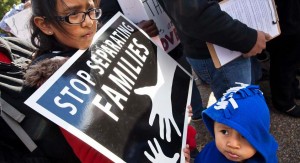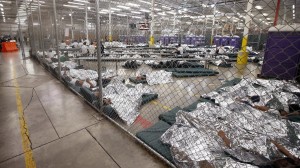NYT Notes ‘Border Kid’ Crisis Is Not Over, But Has Moved
Obama Admin. Fighting To Keep Family Detention Centers

As reported in Politico on 8/7/15: US citizens Esmeralda Tepetate, 10, with her brother Sebastian, 2, whose parents are originally from Mexico, holds a sign that says “stop separating families” during a rally for comprehensive immigration reform, Friday, Nov. 7, 2014, outside of the White House in Washington. After the midterm elections immigration groups are pushing for executive action. (AP Photo/Jacquelyn Martin)
L.A. Times Calls Out Congress Over Immigration Court Backlog
California, Texas Lead In Immigration Court Delays
Judge: 2-Year Waits Triple In Budget-Cut Courts
The number of Los Angeles County civil cases facing delays of more than two years has tripled in the wake of budget cuts, according to Carolyn Kuhl, Los Angeles Superior Court’s presiding judge, She also tells NPR station KQED that “.. L.A. made 10 percent across-the-board cuts to court services in 2012, but it wasn’t enough. So the next year, they made further cuts. In all, 79 courtrooms were shuttered, limiting where people can contest traffic tickets or adjudicate small claims cases. The court has also cut mediation services and eliminated court reporters in civil cases.”
Kuhl noted that “… the setbacks are especially disheartening because she and others have worked for decades to shorten the amount of time it takes to resolve civil cases… and to see those gains essentially be lost — as we now have delays such that the number of cases pending over two years has tripled — is very discouraging.”
The judge’s comments are part of increased media coverage as the state budget process nears its annual decision-making point. Read the story here.
Immigration Courts Face Obama Actions
President Obama’s executive actions on immigration will impact the civil courts system, but it’s hard to know how soon that will happen – or how much the impact will be. Southern California public radio station KPCC is reporting it as “promising news” for immigration judges “… who have long sought more resources for their busy courtrooms, says Bruce Einhorn, a former immigration judge who served in the LA courts for more than 15 years.”:
The KPCC reports says that a typical judge in Los Angeles has about 2,500 cases on their docket, which means an average case takes more than two years to reach a decision, but that could change with Obama’s action. Einhorn, said it will take time to see the effects on the ground. One group that will likely not find relief are the thousands of child migrant cases that are working their way through the courts. As Take Two has been covering on the program, more than 7,000 children are being heard in Los Angeles alone. Since they arrived in the country within the past five years, they probably will not qualify under the new rules from Obama.
Read and listen to the report here: Obama’s actions could affect thousands at LA’s immigration courts.
A.G. Holder Exiting Amid ‘Unfinished’ Work With Immigration Courts
Immigration ‘Rocket Docket’ Raises Ire In S.F.
S.F. Stepping Up In Border-Child Crisis
Read more here: San Francisco to help fund immigration attorneys

